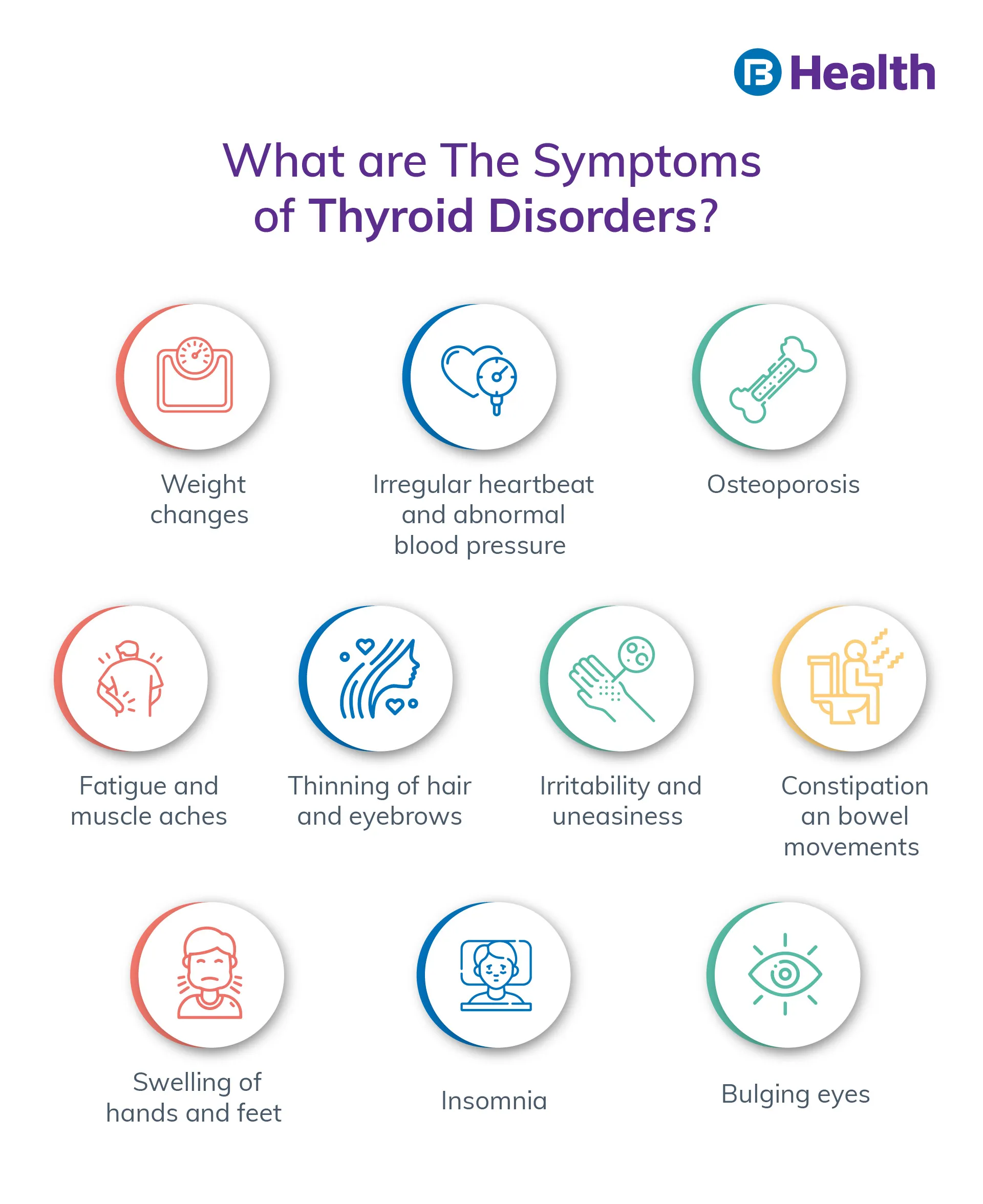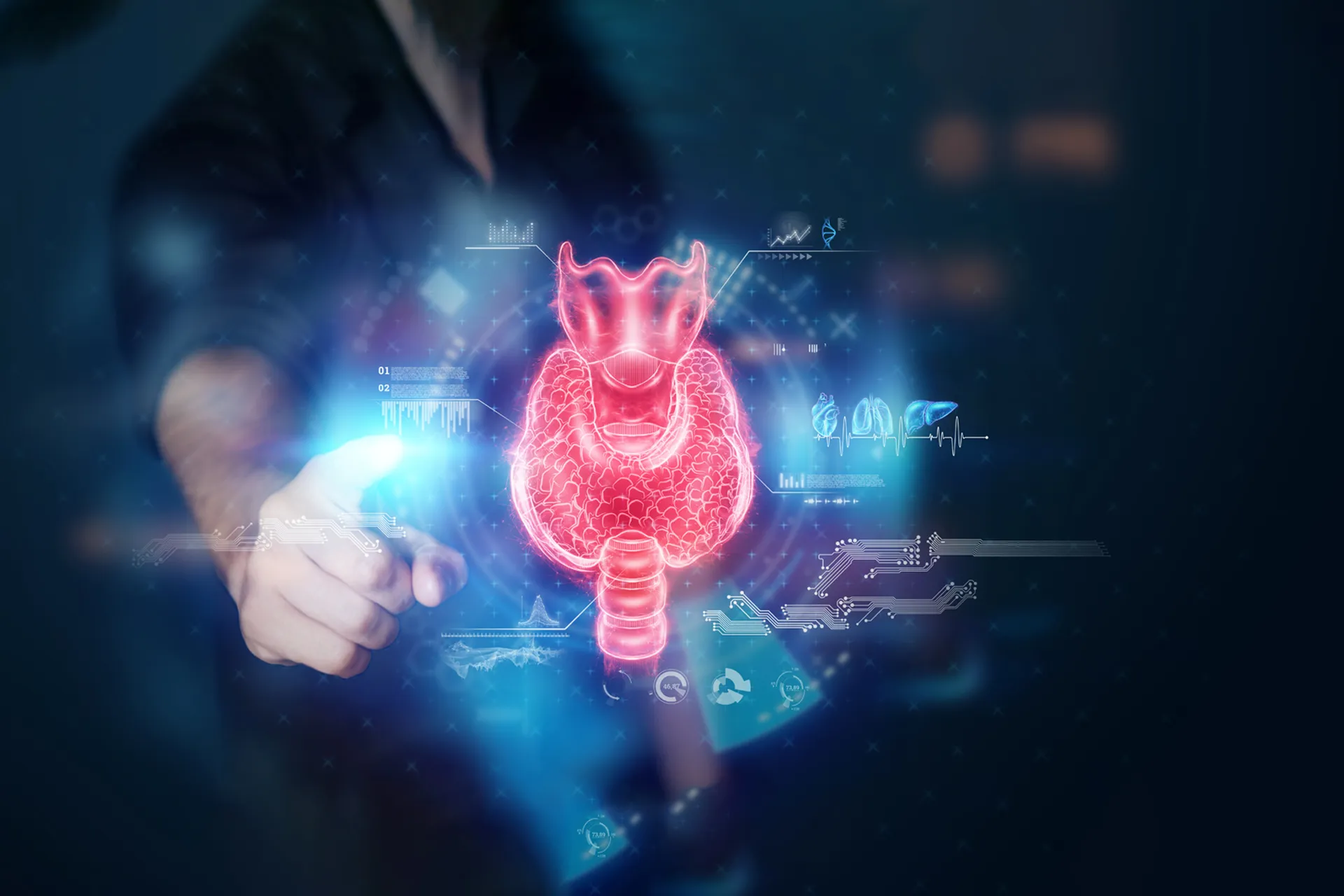Thyroid | 7 min read
Thyroid Effects in Females: Complications and Types
Medically reviewed by
Table of Content
Synopsis
The thyroid gland is a very important gland of the body and is responsible for many functions like regulating the metabolic rate. Maintaining the body’s hormone level is all the work of the thyroid.
Key Takeaways
- The thyroid gland regulates the body temperature
- It affects the body and neural growth
- Thyroid disorders can be cured upon proper care
The endocrine system releases messenger products known as hormones. These hormones specialize in controlling the activities that take place in the human body. The regulation of metabolism is in the hands of these glands and hormones acting on the target specific tissues. The focus of this article will solely be based on thyroid hormone functions and thyroid disorders in females.
Thyroid Gland
The thyroid gland is one of the many ductless endocrine glands in our body that is essential in working bodily functions. It is a butterfly-shaped gland anteriorly placed at the base of the neck. It primarily produces three types of hormones, namely Calcitonin, Tri-iodothyronine (T3) hormone, and Thyroxine hormone (T4). The T4 and T3 control the body’s psychological processes, like growth, development, and metabolism. The production of these hormones is based on the functioning of the pituitary gland and the release of TSH (Thyroid-stimulating hormone).
Types of Thyroid Disorders
Various thyroid disorders depend on the causes and effects of thyroid gland changes. Here are some types of thyroid disorders:
- Hypothyroidism: Results from the insufficient release of thyroid hormone. It can be taken as a deficiency of the product.
- Hyperthyroidism: It is the excessive production of thyroxine. As a result of which, the body cannot cope with it.
- Goitre: The lack of nutritional iodine can cause this thyroid disorder in women.
- Hashimoto’s thyroiditis: This is where the body’s immune system attacks its thyroid gland. It results in gland inflammation, quite common as thyroid side effects in females, especially middle-aged women.
- Graves’ disease: It is a characteristic autoimmune disease that is initially caused by the attack of antibodies on the gland hence, results in overproduction of the hormone.
- Thyroid nodules: Just like any other nodules, these are overgrowths on the thyroid gland. It is highly related to iodine deficiency and can lead to more physical problems.
- Thyroid cancer: Thyroid nodules that become cancerous or malignant by nature. This can lead to thyroid cancer, which may become fatal if it spreads throughout the body.

Thyroid Causes and Triggers
The causes of thyroid disorders are many, but here are a few that can help narrow them down:
- Iodine deficiency: This is the most commonly seen cause, especially in people of hilly areas.
- People working near radioactive regions/ power plants: The thyroid gland can easily be modified if exposed to radiation.
- Radioactive iodine treatment due to any other medical procedure.
- Pituitary disorders and tumors.
- Pregnancy and fluctuation of hormones.
- Obesity or overweight.
- Insulin resistance: Diabetes and thyroid disorders go hand in hand due to their common connectivity and interdependence.
- Exposure to lead and other harmful pollutants.
- Beta blockers, narcotics, anti-seizure, and antidepressants are some of the medications that can induce such thyroxine irregularities.
- Thyroiditis
- Hypothalamic issues (master gland)
- Congenital functioning disorder.
Women are more prone to getting thyroid abnormalities in most situations. [1] Some risk facts include a family history of thyroid disorders, age between 25 to 65 years old, and pre-existing auto-immune disorder.
Additional Read: Manage Thyroid in Winter SeasonSymptoms of Thyroid Disorders
The symptoms can vary greatly depending on the spectrum of thyroid activity and related disorders. But it all boils down to the following signs:
- Weight changes: Can be characterized by weight gain in hypothyroidism or weight loss in hyperthyroidism. Any radical changes in the body mass are considered unhealthy.
- Irregular heartbeat and abnormal blood pressure.
- Muscle weakness: Due to the irregularity in the thyroid gland production of hormones, the body’s muscles can weaken and spasm.
- Osteoporosis: As with muscle, thyroxin production can affect the bones’ strength. Therefore, the risk of weakening of bones runs high.
- Increased sweating and nervousness.
- Irritability and uneasiness.
- Fatigue and muscle aches.
- Impaired memory: Brain development in young kids, a greater rate of dementia and Alzheimer’s.
- Dry and itchy skin.
- Thinning of hair and eyebrows.
- Depression and anxiety disorder.
- Constipation and bowel movements.
- Swelling of hands and feet: Mainly due to water retention, thus causing vein blockage.
- Incapability to sleep, aka insomnia.
- Bulging eyes, as in hypothyroidism.
- Mood swings and trouble thinking
 Thyroid cancer symptoms can be a mixture of the above, along with difficulty in swallowing, visible lump in the throat region, change in the pitch of your voice, and swollen lymph nodes.Thyroid and headache have a special connection since the underlying migraine issues can be addressed by correcting the thyroxine dosages.
Thyroid cancer symptoms can be a mixture of the above, along with difficulty in swallowing, visible lump in the throat region, change in the pitch of your voice, and swollen lymph nodes.Thyroid and headache have a special connection since the underlying migraine issues can be addressed by correcting the thyroxine dosages.Thyroid-related Implications in Women
Compared to men, the risk of running thyroid side effects in females is approximately 10 times more. [2] Fertility and reproduction issues are caused by thyroxine production imbalance. The ovulation cycle can go haphazardly wrong, thus creating chaos during menstruation. Heavy bleeding, absent periods, early menopause, hot flashes, and more. Overactive thyroids can cause osteoporosis due to calcium loss. Thyroid hormones are essential for the normal development of the baby during pregnancy. Thus, depriving the fetus of it will only cause many syndromes such as down’s syndrome. As per many studies, Estrogen changes are linked with thyroxin release.
Thyroid side effects in a female’s pregnancy are as follows:
- Miscarriage
- Ectopic pregnancies
- Pre-term birth and stillbirth
- Heart failure
- Postpartum bleeding
- Unexplained pregnancy weight changes
- Low birthweight
- Pre-eclampsia: Blood pressure rise during late pregnancy
- New-born baby complications such as faster heart rate and risk of disabilities
- Infertility and lack of sexual desire
- The release of the egg is part of the monthly cycle of the female reproductive system
The effects of thyroid changes are not limited to the gland and metabolism but can affect all other systems. The risk of running a cardiovascular disease increases steeply in hypothyroidism. [3] With insulin, glycogen, and other hormones going haywire, digestive enzymes are no exception. This can most likely lead to the onset of diabetes, high cholesterol, and obesity. Heartburn, irregular bowel movements, and bloating are the same effects.
The nerve endings are all controlled by the levels of the thyroid hormone functioning. And if it is messed up, there are effects like numbness, pain, and uncharacteristic tingling. The respiratory system is also affected by the thyroid misfunctioning as it can cause sleep apnea due to shortness of breath. Intolerance towards cold environments can be another triggering sign. This is mainly due to the unevenness in the homeostasis equilibrium and thyroid metabolism.
Thyroid Investigations and Presentation
Since most of the signs for thyroid disorders overlap with other syndromes, it can be difficult to track down. Blood tests to measure thyroid hormone levels are part of the doctor’s examination. Thyroid lab tests are a must to look at the stage of its functioning. CT computed tomography, and MRI magnetic resonance imaging scans are also done. Tests related to all other hormones, such as estrogen, leptin, insulin, and more, are also obtained.
All symptoms must be reported to your doctor. Any missing information can only delay the prognosis of the disorder. The doctors may prescribe a thyroid biopsy if in case of cancer. Especially in cases of thyroid nodules, a fine needle biopsy is taken for investigation under the microscope. A radioactive iodine uptake test is also prescribed to see the functioning of the thyroid hormones.
Additional read: 3 Things to Know About the Thyroid Stimulating Hormone Test
Thyroid Treatment and Cure
In most cases, thyroid treatment can be achieved by bringing the hormone level to a stable level. This can be done by taking oral pills which make up for the loss of the thyroid gland or by regulating the excess by canceling the effects.
Replacing the thyroxine hormone with artificially made hormones, levothyroxine, can be the quickest way to cope with the effects. Some are orally taken, and others are injectable, mostly given by professionals.
As for cancer and nodules, radiation therapy can help in most cases. It is better if diagnose at an early stage before it can spread.
Surgeries are also made available if the goiter or tumor is too large. And in auto-immune cases, the gland will cease to exist due to its self-destructive nature. In some rare cases, the patient can also be urged for surgery to remove the gland.
Iodine labeled radioactive ablation is also provided if the thyroid production is not restricted. If a prolonged lack of treatment continues, the side effects can affect your daily life. Therefore, getting a quick doctor’s consultation is recommended.
Additional Read: Yoga for ThyroidThyroid disorders are very common and go untreated in many. This may lead to more hazardous complications. Knowing more about what can keep you safe and healthy is always wise. If any of the above symptoms strike a chord with you, please look for a medical opinion.
To make this process easy, get doctor consultation in a click on Bajaj Finserv Health.
The best thing here is that you can book a teleconsultation from the comfort of your home and get all the advice you need online. With the convenience and safety this offers, you can start taking the best care of your health!
References
- https://pubmed.ncbi.nlm.nih.gov/23027459/
- https://experiencelife.lifetime.life/article/why-do-thyroid-disorders-affect-women-more-often-than-men/
- https://pubmed.ncbi.nlm.nih.gov/35726428/
Disclaimer
Please note that this article is solely meant for informational purposes and Bajaj Finserv Health Limited (“BFHL”) does not shoulder any responsibility of the views/advice/information expressed/given by the writer/reviewer/originator. This article should not be considered as a substitute for any medical advice, diagnosis or treatment. Always consult with your trusted physician/qualified healthcare professional to evaluate your medical condition. The above article has been reviewed by a qualified doctor and BFHL is not responsible for any damages for any information or services provided by any third party.




